- Clone
- TC15-12F12.2 (See other available formats)
- Regulatory Status
- RUO
- Other Names
- Signaling Lymphocyte Activation Molecule (SLAM), IPO-3
- Isotype
- Rat IgG2a, λ
- Ave. Rating
- Submit a Review
- Product Citations
- publications
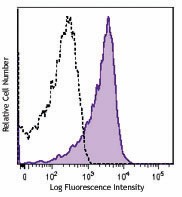
-

C57BL/6 mouse splenocytes were stained with CD150 (clone TC15-12F12.2) Brilliant Violet 650™ (filled histogram) or rat IgG2a Brilliant Violet 650™ isotype control (open histogram). -

C57BL/6 mouse bone marrow cells were stained with CD150 (clone TC15-12F12.2) Brilliant Violet 650™ (filled histogram) or rat IgG2a Brilliant Violet 650™ isotype control (open histogram). Data shown was gated on lymphoid cell population.
| Cat # | Size | Price | Quantity Check Availability | Save | ||
|---|---|---|---|---|---|---|
| 115931 | 125 µL | 231 CHF | ||||
| 115932 | 50 µg | 275 CHF | ||||
This product is eligible for a 40% discount! Purchase two or more BV510, BV570, BV605, or BV650 products in any combination to qualify. Exclusions apply. Visit our webpage to view full promotion details or to contact your local BioLegend representative for a quote.
CD150 is a 75-95 kD member of the immunoglobulin superfamily, also known as SLAM (signaling lymphocyte activation molecule) or IPO-3. CD150, a single chain type I transmembrane molecule, is expressed on thymocytes, T cell subsets, B cells, dendritic cells, and endothelial cells. The expression is upregulated upon activation. CD150 expression has been shown to be maintained on Th1 but not Th2 clones. T regulatory cells express a relatively high level of CD150. Antibodies against CD150 have been shown to augment IFN-γ production by Th1 cells, especially when co-stimulated through the TCR. CD150 associates with the src homology 2-domain-containing protein tyrosine phosphatase SHP-2, and this association is thought to be involved in signal transduction. In combination with CD48, CD150 is a useful marker for hematopoietic stem cell studies.
Product DetailsProduct Details
- Verified Reactivity
- Mouse
- Antibody Type
- Monoclonal
- Host Species
- Rat
- Immunogen
- Mouse SLAM-human IgG1 fusion protein
- Formulation
- Phosphate-buffered solution, pH 7.2, containing 0.09% sodium azide and BSA (origin USA).
- Preparation
- The antibody was purified by affinity chromatography and conjugated with Brilliant Violet 650™ under optimal conditions.
- Concentration
- µg sizes: 0.2 mg/mLµL sizes: lot-specific (to obtain lot-specific concentration and expiration, please enter the lot number in our Certificate of Analysis online tool.)
- Storage & Handling
- The antibody solution should be stored undiluted between 2°C and 8°C, and protected from prolonged exposure to light. Do not freeze.
- Application
-
FC - Quality tested
- Recommended Usage
-
Each lot of this antibody is quality control tested by immunofluorescent staining with flow cytometric analysis. For flow cytometric staining using the µl size, the suggested use of this reagent is 5 µl per million cells in 100 µl staining volume or 5 µl per 100 µl of whole blood. For flow cytometric staining using the µg size, the suggested use of this reagent is ≤0.5 µg per million cells in 100 µl volume. It is recommended that the reagent be titrated for optimal performance for each application.
Brilliant Violet 650™ excites at 405 nm and emits at 645 nm. The bandpass filter 660/20 nm is recommended for detection, although filter optimization may be required depending on other fluorophores used. Be sure to verify that your cytometer configuration and software setup are appropriate for detecting this channel. Refer to your instrument manual or manufacturer for support. Brilliant Violet 650™ is a trademark of Sirigen Group Ltd.
Learn more about Brilliant Violet™.
This product is subject to proprietary rights of Sirigen Inc. and is made and sold under license from Sirigen Inc. The purchase of this product conveys to the buyer a non-transferable right to use the purchased product for research purposes only. This product may not be resold or incorporated in any manner into another product for resale. Any use for therapeutics or diagnostics is strictly prohibited. This product is covered by U.S. Patent(s), pending patent applications and foreign equivalents. - Excitation Laser
-
Violet Laser (405 nm)
- Application Notes
-
The TC15-12F12.2 antibody has been reported to enhance the production of IFN-? by Th1 cells stimulated through TCR. Additional reported applications (for the relevant formats) include: immunoprecipitaion17, enhancing IFN-? production by Th1 cells when stimulated with CD31, and inhibiting CD3 induced T cell proliferation6. The Ultra-LEAF™ purified antibody (Endotoxin <0.01 EU/µg, Azide-Free, 0.2 µm filtered) is recommended for functional assays (Cat. No. 115949 & 115950).
-
Application References
(PubMed link indicates BioLegend citation) -
- Castro AG, et al. 1999. J. Immunol. 163:5860. (FC, Costim, IP)
- Forsberg EC, et al. 2005. PLoS Genet. 1:e28. (FC)
- Terrazas LI, et al. 2005. Int. J. Parasitol. 35:1349. (FC)
- Cannons JL, et al. 2006. J. Exp. Med. 203:1551. (FC)
- Umemoto T, et al. 2006. J. Immunol. 177:7733. (FC)
- Jordan MA, et al. 2007. J. Immunol. 178:1618. (FC, Block) PubMed
- Jung Y, et al. 2007. Blood 110:82. PubMed
- Pimanda JE, et al. 2007. Proc. Natl. Acad. Sci. USA 104:840.
- Sugiyama T, et al. 2007. Proc. Natl. Acad. Sci. USA 104:175.
- Kim I, et al. 2006. Blood 108:737. PubMed
- Ema H, et al. 2006. Nat Protoc. 1:2979. PubMed
- Fraser ST, et al. 2007. Blood 109:4616. PubMed
- Jung Y, et al. 2008. Stem Cells. 26:2042. Pubmed
- Song J, et al. 2010. Blood 115:2592. PubMed
- Cridland SO, et al. 2009. Blood Cell. Mol. Dis. 43:149. (FC) PubMed
- Morita Y, et al. 2010. J. Exp Med. 207:1173. PubMed
- Talaei N, et al. 2015. J. Immunol. 195(10):4623. PubMed
- Product Citations
-
- RRID
-
AB_2562402 (BioLegend Cat. No. 115931)
AB_2715765 (BioLegend Cat. No. 115932)
Antigen Details
- Structure
- Ig superfamily, 75-95 kD
- Distribution
-
Thymocytes, T cell subset, B lymphocytes, dendritic cells, endothelial cells
- Function
- B cell and dendritic cell costimulation
- Ligand/Receptor
- CD150
- Cell Type
- B cells, Dendritic cells, Endothelial cells, T cells, Thymocytes, Tregs
- Biology Area
- Costimulatory Molecules, Immunology, Innate Immunity
- Molecular Family
- Adhesion Molecules, CD Molecules
- Antigen References
-
1. Cocks BG, et al. 1995. Nature 376:260.
2. Punnonen J, et al. 1997. J. Exp. Med. 185:993.
3. Sidorenko SP, et al. 1993. J. Immunol. 151:4614. - Gene ID
- 27218 View all products for this Gene ID
- Specificity (DOES NOT SHOW ON TDS):
- CD150
- Specificity Alt (DOES NOT SHOW ON TDS):
- CD150
- App Abbreviation (DOES NOT SHOW ON TDS):
- FC
- Hidden Names (DOES NOT SHOW ON TDS):
- IPO3, Hematopoietic Stem Cell, T Follicular Helper
- UniProt
- View information about CD150 on UniProt.org
Related FAQs
Other Formats
View All CD150 Reagents Request Custom ConjugationCustomers Also Purchased
Compare Data Across All Formats
This data display is provided for general comparisons between formats.
Your actual data may vary due to variations in samples, target cells, instruments and their settings, staining conditions, and other factors.
If you need assistance with selecting the best format contact our expert technical support team.
-
Purified anti-mouse CD150 (SLAM)
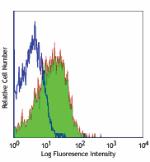
C57BL/6 mouse splenocytes were stained with purified CD150 (... -
PE anti-mouse CD150 (SLAM)
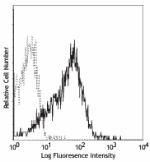
C57BL/6 mouse splenocytes were stained with CD150 (clone TC1... 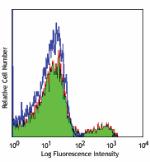
C57BL/6 mouse bone marrow cells were stained with CD150 (clo... -
Biotin anti-mouse CD150 (SLAM)
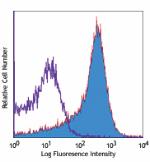
C57BL/6 mouse splenocytes were stained with biotinylated CD1... -
APC anti-mouse CD150 (SLAM)
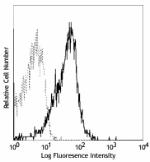
C57BL/6 mouse splenocytes were stained with CD150 (clone TC1... 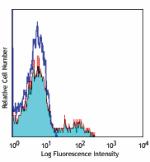
C57BL/6 mouse bone marrow cells were stained with CD150 (clo... -
PE/Cyanine5 anti-mouse CD150 (SLAM)
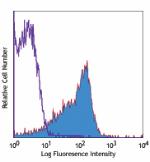
C57BL/6 mouse splenocytes were stained with CD150 (clone TC1... 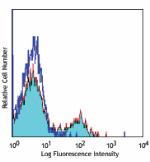
C57BL/6 mouse bone marrow cells were stained with CD150 (clo... -
PE/Cyanine7 anti-mouse CD150 (SLAM)
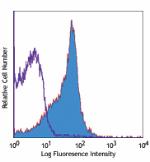
C57BL/6 mouse splenocytes were stained with CD150 (clone TC1... 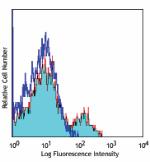
C57BL/6 mouse bone marrow cells were stained with CD150 (clo... -
Alexa Fluor® 488 anti-mouse CD150 (SLAM)
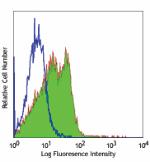
C57BL/6 mouse splenocytes were stained with CD150 (clone TC1... 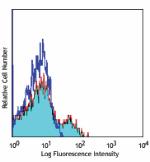
C57BL/6 mouse bone marrow cells were stained with CD150 (clo... -
Alexa Fluor® 647 anti-mouse CD150 (SLAM)
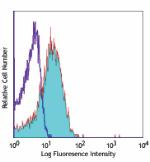
C57BL/6 mouse splenocytes were stained with CD150 (clone TC1... 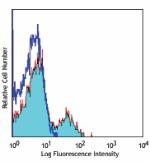
C57BL/6 mouse bone marrow cells were stained with CD150 (clo... -
PerCP/Cyanine5.5 anti-mouse CD150 (SLAM)
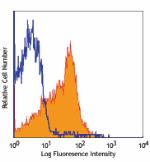
C57BL/6 mouse splenocytes were stained with CD150 (clone TC1... 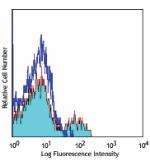
C57BL/6 mouse bone marrow cells were stained with CD150 (clo... -
Pacific Blue™ anti-mouse CD150 (SLAM)
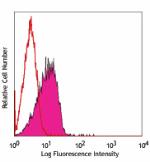
C57BL/6 mouse splenocytes were stained with CD150 (clone TC1... -
Brilliant Violet 421™ anti-mouse CD150 (SLAM)
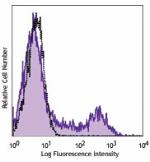
C57BL/6 mouse bone marrow cells were stained with SLAM (clon... 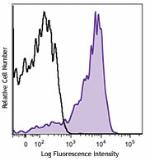
C57BL/6 mouse splenocytes were stained with SLAM (clone TC15... -
Brilliant Violet 605™ anti-mouse CD150 (SLAM)
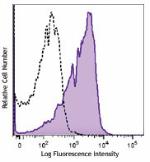
C57BL/6 mouse splenocytes were stained with CD150 (clone TC1... -
Brilliant Violet 510™ anti-mouse CD150 (SLAM)
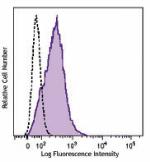
C57BL/6 mouse splenocytes were stained with SLAM (clone TC15... -
Brilliant Violet 650™ anti-mouse CD150 (SLAM)
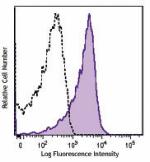
C57BL/6 mouse splenocytes were stained with CD150 (clone TC1... 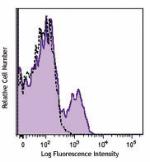
C57BL/6 mouse bone marrow cells were stained with CD150 (clo... -
Purified anti-mouse CD150 (SLAM) (Maxpar® Ready)
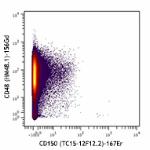
Mouse bone marrow cells stained with 156Gd anti-CD48 (HM48.1... -
PE/Dazzle™ 594 anti-mouse CD150 (SLAM)
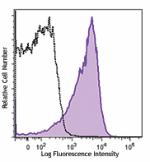
C57BL/6 mouse splenocytes were stained with CD150 (clone TC1... 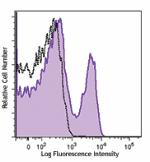
C57BL/6 mouse bone marrow cells were stained with CD150 (clo... -
Brilliant Violet 785™ anti-mouse CD150 (SLAM)
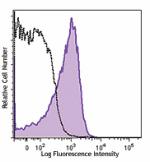
C57BL/6 mouse splenocytes were stained with CD150 (clone TC1... 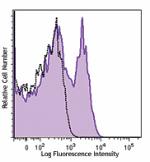
C57BL/6 mouse bone marrow cells were stained with CD150 (clo... -
APC/Fire™ 750 anti-mouse CD150 (SLAM)
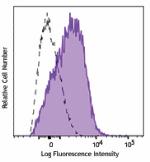
C57BL/6 Mouse splenocytes were stained with CD150 (SLAM) (cl... 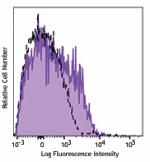
C57BL/6 mouse bone marrow cells were stained with CD150 (SLA... -
Brilliant Violet 711™ anti-mouse CD150 (SLAM)
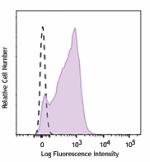
C57BL/6 mouse splenocytes were stained with CD150 (clone TC1... 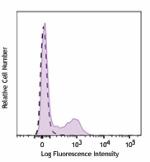
C57BL/6 mouse bone marrow cells were stained with CD150 (clo... -
TotalSeq™-A0203 anti-mouse CD150 (SLAM)
-
TotalSeq™-C0203 anti-mouse CD150 (SLAM)
-
Ultra-LEAF™ Purified anti-mouse CD150 (SLAM)
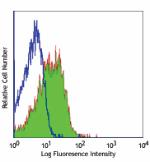
C57BL/6 mouse splenocytes were stained with Ultra-LEAF™ puri... -
TotalSeq™-B0203 anti-mouse CD150 (SLAM)
 Login / Register
Login / Register 











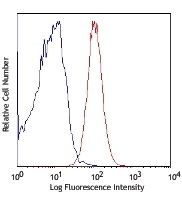
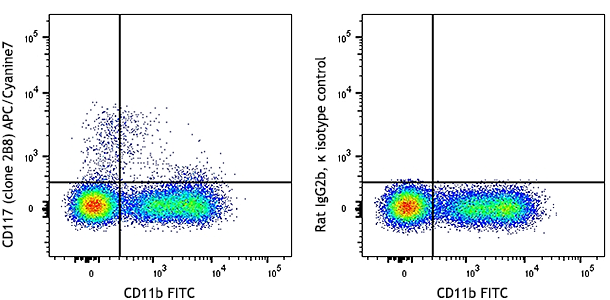
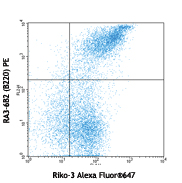
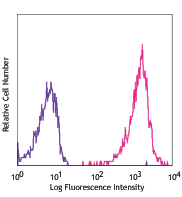



Follow Us